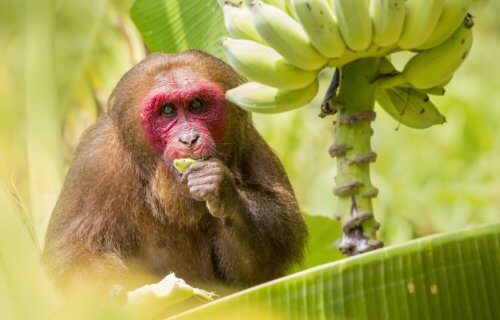
BERKELEY, Calif. — It may not be for everyone, but plenty of people love the taste of alcohol. Now, a new study suggests humans inherited the taste for booze from our primate ancestors millions of years ago.
Originally coined the “drunken monkey” hypothesis in 2014 by UC Berkeley biologist Robert Dudley, the original theory suggests monkeys discovered that the smell of alcohol could lead them to ripe, fermenting, and nutritious fruit.
Alcohol for energy?
Even if you personally abstain from beer, whiskey, and everything in between, there’s little denying others still have the evolutionary taste for booze. People drink on holidays to celebrate, on happy occasions to remember, and during bad times to forget. This latest study, by primatologist Christina Campbell of California State University, Northridge (CSUN), and her graduate student Victoria Weaver, collected and analyzed fruit eaten and discarded by black-handed spider monkeys (Ateles geoffroyi) in Panama.
Sure enough, alcohol concentrations found in the fruits ranged between one and two percent by volume. Those percentages are indicative of a natural fermentation byproduct coming from yeasts eating sugar in ripening fruit. Simply put, the monkeys were consuming alcohol. Additionally, urine samples from those same free-roaming monkeys revealed secondary metabolites of alcohol. This finding in particular is of note, researchers say, because it suggests the alcohol wasn’t just passing through the monkeys’ bodies – they were using it for energy.
“For the first time, we have been able to show, without a shadow of a doubt, that wild primates, with no human interference, consume fruit-containing ethanol,” says Campbell, a CUSN professor of anthropology who obtained her Ph.D. in anthropology from Berkeley in 2000, in a university release.
“This is just one study, and more need to be done, but it looks like there may be some truth to that ‘drunken monkey’ hypothesis — that the proclivity of humans to consume alcohol stems from a deep-rooted affinity of frugivorous (fruit-eating) primates for naturally-occurring ethanol within ripe fruit.”
Drinking for the calories?
Prof. Dudley’s book, published eight years ago, says some fruits eaten by primates contain as much as seven percent alcohol. Back then, however, Dudley did not have any actual data to back up his idea that monkeys or apes preferentially seek out and eat fermented fruits. He also did not have data to support the theory that the primates digested alcohol after consuming the fruit.
So, for this newest project, the team at CSUN collaborated with Prof. Dudley and UC Berkeley graduate student Aleksey Maro to analyze the alcohol content found in the fruits.
“It (the study) is a direct test of the drunken monkey hypothesis,” Dudley, UC Berkeley professor of integrative biology, adds. “Part one, there is ethanol in the food they’re eating, and they’re eating a lot of fruit. Then, part two, they’re actually metabolizing alcohol — secondary metabolites, ethyl glucuronide and ethyl sulfate are coming out in the urine. What we don’t know is how much of it they’re eating and what the effects are behaviorally and physiologically. But it’s confirmatory.”
The team conducted the research on Barro Colorado Island in Panama. The ripe, alcoholic fruits (1-2%) the monkeys ate were a major part of their diets, and taken from the jobo tree, Spondias mombin. It’s worth noting, though, that humans eat those same fruits. Indigenous human populations in Central and South America have used the fruit to create chicha, a fermented alcoholic beverage, for centuries.
“The monkeys were likely eating the fruit with ethanol for the calories,” Campbell says. “They would get more calories from fermented fruit than they would from unfermented fruit. The higher calories mean more energy.”
Are monkeys getting drunk from eating fruit?
Probably not, according to Prof. Dudley.
“They’re probably not getting drunk, because their guts are filling before they reach inebriating levels,” he explains. “But it is providing some physiological benefit. Maybe, also, there’s an anti-microbial benefit within the food that they’re consuming, or the activity of the yeast and the microbes may be predigesting the fruit. You can’t rule that out.”
Moreover, Campbell adds that monkeys’ high caloric dietary needs may have influenced our early human ancestors’ dietary decisions regarding fruit.
“Human ancestors may also have preferentially selected ethanol-laden fruit for consumption, given that it has more calories,” the researcher comments. “Psychoactive and hedonic effects of ethanol may similarly result in increased consumption rates and caloric gain.”
Of course, today one can’t walk down a street without an opportunity to drink or purchase alcohol. While the problem of alcoholism isn’t going away any time soon, study authors are hopeful their work may help society and individuals better understand the very earliest roots of alcohol abuse.
“Excessive consumption of alcohol, as with diabetes and obesity, can then be viewed conceptually as a disease of nutritional excess,” Campbell concludes.
The findings appear in the journal Royal Society Open Science.

Alcohol has no flavor.
The ethanol in the fruit comes from partially metabolized glucose. Why would the monkeys get more energy from the ethanol rather than the glucose that produced the ethanol?
Results are flawed as there can’t be be more calories in fermented fruit. It’s the sugar in the fruit that turns to alcohol; you can’t create more calories from less.
Nothing better than some monkey shine.
As an X drunk I have more than anecdotal words. Prior to 20 years of sobriety, it hit me that I needed to make better choices. Yes, it IS a genetic thing. My family has suffered through alcoholism and death from it. Today AA says it’s a disease. Umm, no, there are however many true diseases out there though; chlamydia, influenza, staph, E.coli, herpes to name a few. Making excuses seems to be another disease. Being weak kneed another.